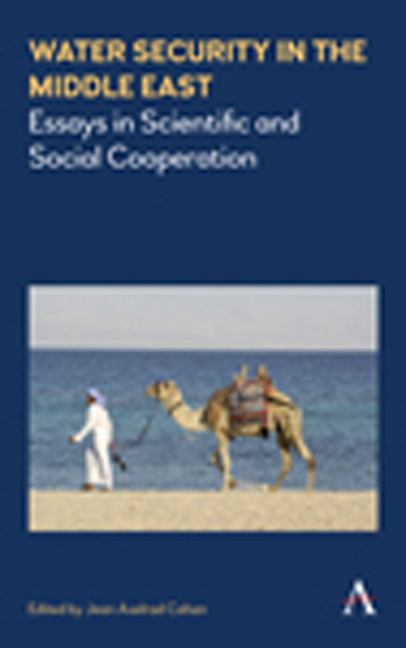Book contents
- Frontmatter
- Contents
- List of Illustrations
- Acknowledgments
- Foreword
- Introduction Water Security in the Middle East: A Role for the Social Sciences and Humanities
- Chapter 1 Cooperation Rules: Insights on Water and Conflict from International Relations
- Chapter 2 Water Security in Transboundary Systems: Cooperation in Intractable Conflicts and the Nile System
- Chapter 3 Water-Demand Management in the Arab Gulf States: Implications for Political Stability
- Chapter 4 A Watershed-Based Approach to Mitigating Transboundary Wastewater Conflicts between Israel and the Palestinian Authority: The Besor-Hebron-Be'er Sheva Watershed
- Chapter 5 The Evolution of Israeli Water Management: The Elusive Search for Environmental Security
- Chapter 6 Adapting to Climatic Variability along International River Basins in the Middle East
- Chapter 7 Water and Politics in the Tigris-Euphrates Basin: Hope for Negative Learning?
- Chapter 8 The Political and Cultural Dimensions of Water Diplomacy in the Middle East
- Notes on Contributors
- Index
Chapter 4 - A Watershed-Based Approach to Mitigating Transboundary Wastewater Conflicts between Israel and the Palestinian Authority: The Besor-Hebron-Be'er Sheva Watershed
- Frontmatter
- Contents
- List of Illustrations
- Acknowledgments
- Foreword
- Introduction Water Security in the Middle East: A Role for the Social Sciences and Humanities
- Chapter 1 Cooperation Rules: Insights on Water and Conflict from International Relations
- Chapter 2 Water Security in Transboundary Systems: Cooperation in Intractable Conflicts and the Nile System
- Chapter 3 Water-Demand Management in the Arab Gulf States: Implications for Political Stability
- Chapter 4 A Watershed-Based Approach to Mitigating Transboundary Wastewater Conflicts between Israel and the Palestinian Authority: The Besor-Hebron-Be'er Sheva Watershed
- Chapter 5 The Evolution of Israeli Water Management: The Elusive Search for Environmental Security
- Chapter 6 Adapting to Climatic Variability along International River Basins in the Middle East
- Chapter 7 Water and Politics in the Tigris-Euphrates Basin: Hope for Negative Learning?
- Chapter 8 The Political and Cultural Dimensions of Water Diplomacy in the Middle East
- Notes on Contributors
- Index
Summary
Introduction
Approximately 16 streams in Israel are transboundary in nature, or shared between Israel and the Palestinian Authority (PA), and roughly two-thirds of these streams originate in Palestinian territory, flow through Israel and discharge into the Mediterranean Sea. Lack of cooperation on water management between Israel and the PA has contributed to high levels of pollution in these waterways, preventing beneficial agricultural, recreational and ecological uses. Past experience shows that effective restoration of Israel's streams requires a coordinated effort between Israelis and Palestinians. If one side invests in infrastructure to improve water quality, but the other continues to pollute, the investments will not result in meaningful improvements to the quality of the regional environment. However, to date such coordination has been minimal and cooperation is difficult.
In principle, most water experts in Israel and the PA recognize the need to adopt watershed-based approaches to water management, acknowledging that rivers, wetlands and groundwater provide important ecological services including waste assimilation, floodwater storage and erosion control. These services provide additional social and economic benefits, such as improved water resources for domestic, agricultural and recreational use. However, because water does not recognize political borders, the ongoing Israeli-Palestinian conflict makes the adoption of watershed-based approaches more challenging because most watersheds in this region, as indicated above, are transboundary in nature. While Israeli and Palestinian water experts have cooperated on transboundary water issues for decades, this cooperation has been mainly technical or research based. We believe that a comprehensive watershed management plan should incorporate ecological, historical, physical, economic and geographical terms agreed upon by both sides. This would serve the best interests of the watershed, regardless of present or future political issues. This chapter argues that since the majority of Israel's water resources (surface and groundwater) are transboundary, Israeli and Palestinian water policy should center on a transboundary approach to watershed management.
General conditions
Drought, population growth and rapid agricultural, industrial and commercial expansion have widened the gap between water supply and demand in Israel and the PA. Israel has bridged this imbalance by developing sophisticated technologies to increase water supply through desalination and wastewater treatment and reuse, while Palestinian infrastructure, technology and investment lag behind. West Bank Palestinians experience frequent water shortages, and the treatment and reuse of wastewater are very limited.
- Type
- Chapter
- Information
- Water Security in the Middle EastEssays in Scientific and Social Cooperation, pp. 93 - 124Publisher: Anthem PressPrint publication year: 2017



